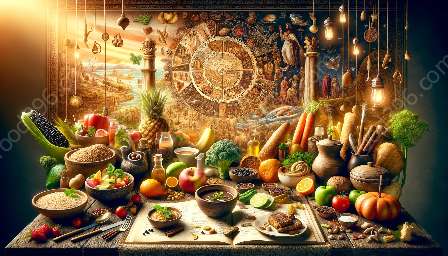Vegan cuisine is shaped by a variety of factors, including cultural, environmental, and religious influences. The impact of religious groups on vegan cuisine can be seen through their dietary restrictions, beliefs, and practices. Understanding these influences provides insight into the diverse origins and evolution of vegan cuisine.
History of Vegan Cuisine
Veganism has a rich history deeply intertwined with various cultures and cuisines. The roots of vegan cuisine can be traced back to ancient civilizations where plant-based diets were adopted for spiritual, environmental, or health reasons. Throughout history, religious groups have played a significant role in the development and popularization of vegan cuisine, influencing the ingredients, cooking techniques, and flavors associated with plant-based dishes.
Influence of Religious Groups
Jainism
Jainism, an ancient religion originating in India, has had a profound influence on vegan cuisine. Jains adhere to a strict vegetarian diet that excludes root vegetables and certain food items believed to cause harm to living beings. As a result, Jain cuisine emphasizes the use of non-violent ingredients such as legumes, vegetables, and grains. The concept of ahimsa, or non-violence, is central to Jain dietary practices, shaping the development of vegan-friendly dishes that are rich in flavor and nutrition.
Buddhism
Buddhist cuisine, prevalent in regions such as East Asia, incorporates the principles of compassion and mindfulness into its culinary traditions. Many Buddhist monks and followers adhere to a plant-based diet as a means of promoting compassion towards all living beings. This emphasis on non-harm extends to the preparation of vegan dishes that are not only nourishing but also reflective of Buddhist values. Vegan cuisine influenced by Buddhism often features a diverse array of plant-based ingredients, creatively prepared to offer a harmonious balance of tastes and textures.
Hinduism
Hinduism, one of the world's oldest religions, has significantly impacted the evolution of vegan cuisine. The concept of ahimsa, or non-violence, is central to Hindu dietary practices, inspiring the development of a wide range of delicious vegan dishes. Traditional Hindu cuisine showcases an abundance of plant-based ingredients, herbs, and spices, reflecting a deep reverence for nature and ethical food consumption. The fusion of traditional cooking techniques and spiritual beliefs has given rise to an array of flavorful vegan delicacies that are enjoyed by both devotees and food enthusiasts alike.
Christianity
Within Christianity, various denominations have distinct dietary practices that have contributed to the diversity of vegan cuisine. Many Christian traditions observe periods of fasting and abstinence, during which followers abstain from consuming animal products. This has led to the creation of plant-based dishes that are rich in symbolism and history, with traditional recipes passed down through generations. Christian-inspired vegan cuisine often incorporates seasonal fruits, vegetables, and herbs, embodying the spirit of simplicity and mindfulness in food preparation.
Islam
Islamic dietary guidelines, as outlined in halal principles, emphasize the consumption of permissible (halal) foods and the avoidance of prohibited (haram) items. While not explicitly vegan, Islamic cuisine offers a wide array of plant-based dishes that cater to diverse tastes and dietary needs. The influence of Islamic traditions on vegan cuisine is evident in the use of aromatic spices, legumes, and grains, creating a tapestry of vibrant flavors and textures that reflect the cultural diversity of Muslim communities.
Impact on Vegan Cuisine
The influence of religious groups on vegan cuisine extends beyond culinary practices and ingredients. It has contributed to the preservation of traditional cooking methods, the adaptation of plant-based substitutes, and the promotion of ethical and sustainable food choices. The fusion of religious beliefs and vegan culinary traditions has led to a global appreciation of diverse flavors, textures, and cooking techniques that celebrate the richness of plant-based cuisine.
Conclusion
The influence of religious groups on vegan cuisine is a testament to the profound impact of cultural and spiritual beliefs on food practices. By exploring the intersection of religious traditions and vegan culinary arts, a deeper appreciation for the diversity and richness of plant-based cuisine emerges. Understanding the influence of religious groups offers valuable insights into the historical, cultural, and ethical dimensions of vegan cuisine, enriching the culinary landscape with an array of delightful and nourishing dishes.

